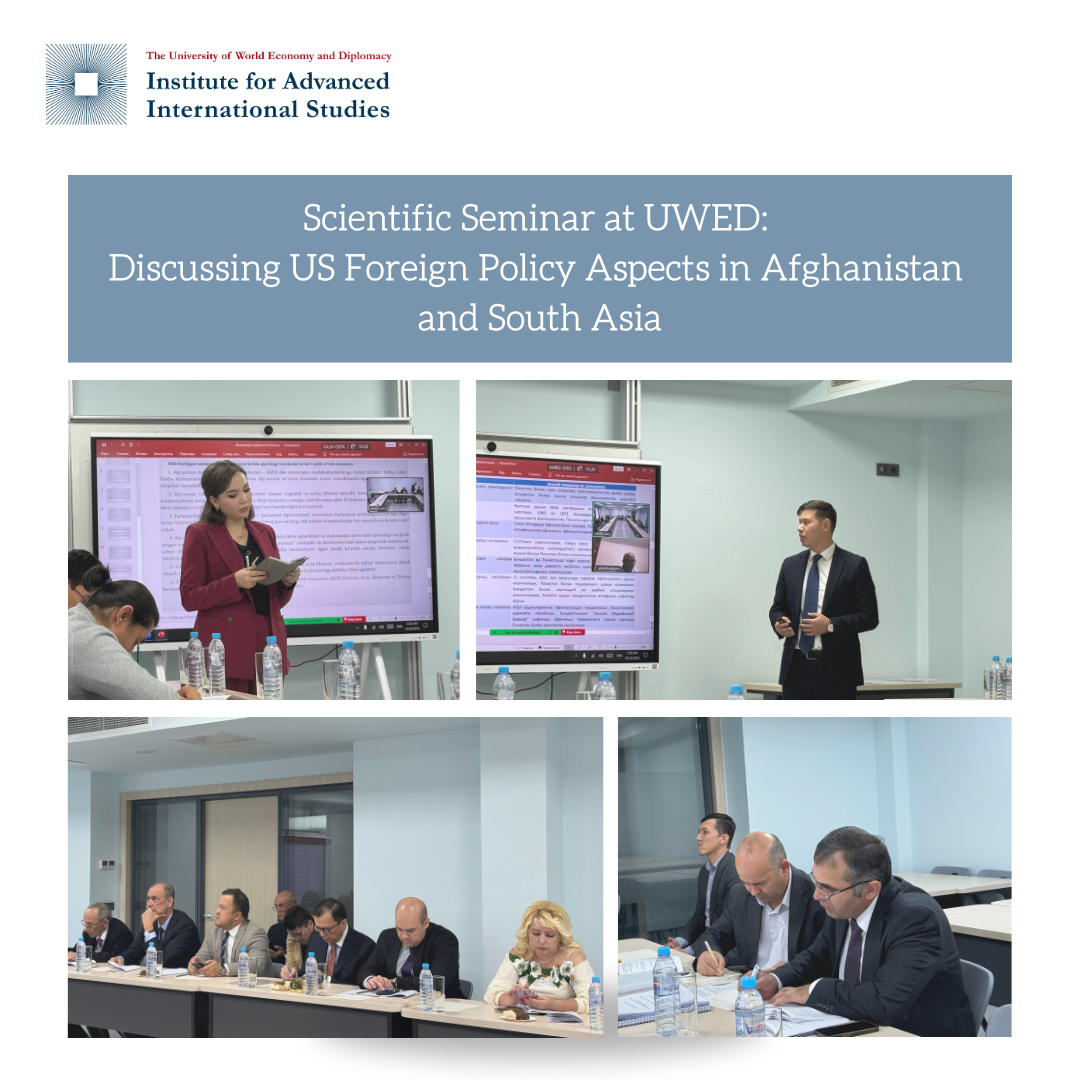
On 23 October 2024 the University of World Economy and Diplomacy hosted a scientific seminar devoted to the thesis works on the specialty 23.00.04 – “International relations, political issues of world and regional development” of PhD candidates in Political Science Yulduzkhon Imomova on the theme “Evolution of the Afghan vector of US foreign policy: trends and prospects” under the scientific guidance of Dr. Kodir Juraev, a member of the Committee on International Affairs and Interparliamentary Affairs of the Legislative Chamber of the Oliy Majlis of the Republic of Uzbekistan, and Islomkhon Gafarov on “Contemporary U.S. Foreign Policy in the South Asian Region (India and Pakistan Case Studies)” under the supervision of Dr Akram Umarov, First Vice-Rector for Academic Affairs at UWED.
In her speech, Yulduzkhon Imomova noted that her research covers the period from the beginning of the 21st century to the present, paying special attention to the transformation of US policy in Afghanistan and its consequences for regional security. The paper consistently examines the theoretical and conceptual foundations of US foreign policy, including the balance between isolationism and international engagement, as well as the formation of liberal hegemonism. Particular attention is paid to the evolution of US policy in Afghanistan, from military intervention after the events of 11 September 2001 to the complete withdrawal of troops in 2021 and the subsequent rise to power of the Taliban.
A significant part of the thesis is devoted to analysing the influence of the Afghan factor on the development of the strategic partnership between the United States and Uzbekistan. The author examines in detail how the situation in Afghanistan has contributed to the expansion of Uzbek-American co-operation in various spheres, including security, economy and humanitarian interaction. Particular emphasis is placed on Uzbekistan’s role in regional processes and its endeavour to transform Afghanistan from a source of threats to a source of opportunities for regional development.
In the final part of the paper, the author presents practical recommendations for strengthening Uzbek-American cooperation in the context of Afghan issues, including proposals for developing inter-parliamentary dialogue, intensifying research cooperation and developing joint economic programs. The study emphasises the importance of taking into account the Afghan factor in the implementation of Uzbekistan’s foreign policy strategy in the changing geopolitical situation in Central Asia.
Islomkhon Gafarov in the presentation of his thesis presented a comprehensive analysis of the transformation of the US foreign policy strategy in the South Asian region. Special attention was paid to international relations through the prism of constructivism. This approach occupies a key place in the theoretical part of the work, as constructivism considers international processes not only through the traditional factors of power and interests, but also through ideological and cultural aspects. Using the example of US foreign policy in South Asia, the author shows how this theory is applicable to analysing long-term relations with India and Pakistan. The author argues that US foreign policy in the region reflects not only pragmatic strategic goals such as containing communism or fighting terrorism, but also constructivist aspects such as democratic values and perceptions of allies. This is particularly evident in relations with India, which is seen by the US as an important democratic partner that shares similar ideological principles.
The study demonstrates how, over the past seven decades, South Asia has emerged as one of the key regions shaping global geopolitical dynamics. The author identifies seven historical periods in the evolution of American foreign policy in the region, beginning in 1947 and ending with the current phase following the withdrawal from Afghanistan in 2021. It also analyses the factors that have influenced the transformation of US regional policy, including India’s rise as a global player, the development of the North-South international transport corridor, India and Pakistan’s entry into the SCO, and Pakistan’s strategic pivot towards cooperation with China.
The key conclusion of the study is the identification of the cyclical nature of American foreign policy in the region, characterised by alternating periods of active engagement and relative distancing. At the same time, there is a significant transformation of US priorities: if during the Cold War Pakistan was the main regional partner, in modern conditions the emphasis has shifted to the development of strategic partnership with India.
Based on the results of the preliminary review of the theses, the dissertations were recommended for further defence, taking into account the comments of the commission members. The Commission noted that both studies are of significant interest to specialists in international relations, political scientists and regional security experts, providing a systematic analysis of the historical dynamics and current trends of the US foreign policy strategy, but proposed to make some clarifications to the methodological part of the work and to expand the empirical base of the study.
The Institute for Advanced International Studies wishes the researchers success in obtaining their scientific degrees and further academic achievements!